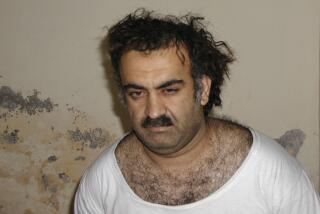Court Refuses to Free Lodi Men Accused of Terror Camp Ties
- Share via
SACRAMENTO — A federal judge refused Tuesday to release two jailed Lodi men accused of lying about ties to terrorist camps, but left open the possibility they could be set free before trial if friends and relatives posted a hefty bail.
U.S. Magistrate Judge Dale Drozd cautioned that the pair -- Hamid Hayat, 22, and his father, Umer Hayat, 47 -- still pose a significant risk of fleeing to their native Pakistan, and that any bail amount would have to be substantial.
“In my view this is not a $500,000 bail case,” Drozd said, declining to say how much it would take to persuade him to set the Hayats free. “This is an extremely serious case posing a very high risk of flight.”
But the judge rejected an argument by prosecutors that the pair would pose a public risk if released, noting that the government’s case so far does not include any charges involving violent acts.
Johnny Griffin III, Umer Hayat’s attorney, said he would return to court soon with a bail proposal that would include property from sympathizers in Lodi’s Pakistani community and elsewhere in the state.
The hearing, which began Monday and spread over parts of two afternoons, came as prosecutors released new details about their case in an attempt to spell out the alleged potential threat derailed by the arrests of the father and son in early June.
A legal brief filed last week said an unidentified “cooperating witness” recorded a series of conversations with Hamid Hayat in 2003.
The younger Hayat reportedly said during one conversation that he “believed in jihad and swore that he would go to jihad.” He also told the informant that he had been accepted to attend a training camp in late 2003.
The prosecution document also said Hamid Hayat failed a polygraph test during his interrogation by the FBI, then admitted that he attended a jihadist training camp in Pakistan for three to six months in 2003 and 2004.
“The purpose of both camps was to train for jihad and to teach people to kill those who work against Muslims,” the U.S. government document said, adding that training included instruction in explosives and hand-to-hand combat.
Though the younger Hayat did not “have any orders to fight at present,” the prosecution document alleged, “he was awaiting such orders” at the time of his arrest.
Umer Hayat told FBI interrogators during a videotaped interview that his son became interested in attending a jihadi training camp in his early teens after being influenced by a classmate in Pakistan at a madrasa, a Muslim religious school. The younger Hayat spent about a decade of his life in Pakistan, prosecutors said.
The document alleges that the madrasa, run by Hayat’s grandfather, sends students to terrorist training camps in Pakistan.
Because of that family connection, prosecutors say, Hamid Hayat was invited to observe several operational training camps, with a driver ferrying him from camp to camp. He saw weapons and urban warfare training, physical training and classroom instructions, according to prosecutors.
At his arrest, prosecutors said, Hamid Hayat’s wallet contained a scrap of paper that included a brief statement in Arabic: “Lord let us be at their throats, and we ask you to give us refuge from their evil.”
Prosecutors argued in court Tuesday that the Hayats pose a flight risk because they have only tangential economic and familial ties to the U.S. The family has built a home in Pakistan.
Griffin, the defense attorney, said he intends at trial to aggressively counter the government’s version of the conversations between the government’s witness and the Hayats. He said the witness, who remains anonymous but appears to be a federal agent, was aggressive and posed leading questions.
He told the judge that Umer Hayat “wants to stay here, clear his name and fight these allegations.” Even if the ice cream truck driver wins release from jail before the trial, Griffin added, “he won’t be able to walk across the street without a whole host of government agents following him.”
Wazhma Mojaddidi, Hamid Hayat’s attorney, said that the young man did not enjoy living in Pakistan, but that his family wanted him to get a traditional Muslim education and his aging grandparents needed his aid.
She said his goal was to have his young wife, who still lives in Pakistan, join him in the U.S. and to work toward earning a high school diploma.
More to Read
Sign up for Essential California
The most important California stories and recommendations in your inbox every morning.
You may occasionally receive promotional content from the Los Angeles Times.













